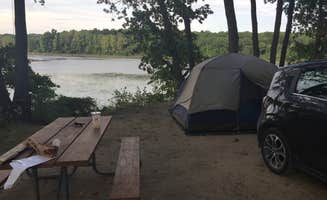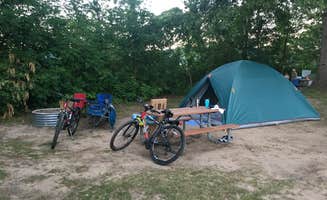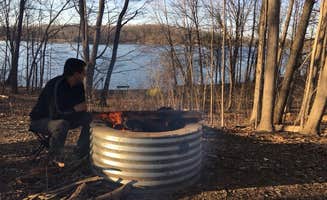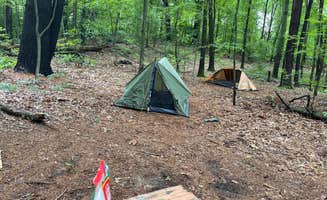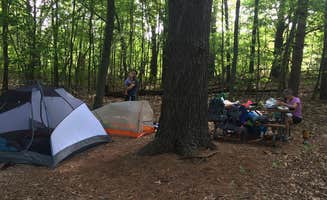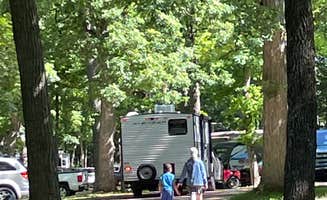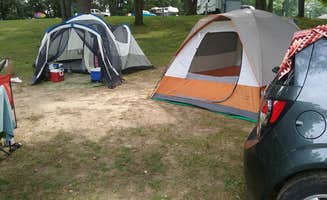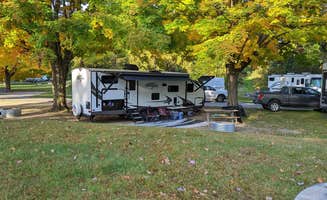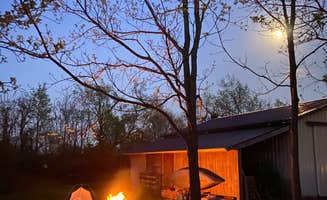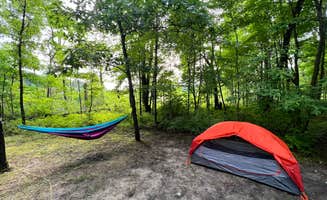The Waterloo-Pinckney Trail system connects multiple campgrounds near Chelsea, Michigan, creating over 30 miles of backcountry hiking routes through wetlands and hardwood forests. Average summer temperatures range from 75-85°F with frequent evening thunderstorms between June and August. Camping options span from hike-in rustic sites along remote lakes to developed campgrounds with modern amenities, most requiring reservations through Michigan's DNR system.
What to do
Backpacking adventures: Blind Lake Rustic Campground offers a true wilderness experience accessible only by hiking, biking or paddling. Located about 7 miles from Silver Lake day use area along the Potawatomi Trail, it requires planning. "You can hike or paddle in, no car access. The hike can be done a few different ways with the shortest being around 4 miles. We opted for the longer one which was about 7 and it was beautiful," notes Kate K.
Swimming and water activities: The swimming beaches at Sugarloaf Campground feature crystal clear water and designated swimming zones. "The camp sites were nice, there was a nice swimming area in crystal clear water and a beautiful bathhouse," says Kevin C. The campground maintains a proper beach area with concessions available during peak summer months.
Trail riding: The extensive trail system connects many campgrounds in the region, creating opportunities for mountain biking and hiking. "We loved the trails for Mountain Bikes that are close to the Campsite! They are super fun!!" reports Maria G. about Bruin Lake Campground. Most trails are well-marked with numbered posts and range from beginner-friendly loops to challenging sections with steep hills.
What campers like
Lakefront sites: Many campers appreciate the water views at Crooked Lake Rustic Campground, which offers a more secluded experience. "We could see the lake and had an outhouse right nearby," mentions Cathy E., who stayed in site #22. Several campgrounds in the area feature lakefront sites, though they book quickly during summer months.
Clean facilities: Campgrounds in the region generally maintain clean restrooms and shower facilities. At Sugarloaf Campground, Kim S. noted: "Facilities were nice and clean and many sites had trees to give shade at certain times of day." The modern campgrounds feature regular maintenance schedules for bathrooms and shower houses.
Wildlife viewing: Early mornings and evenings provide opportunities to spot local wildlife. "We were greeted by a deer crossing our path. Cranes, Swans, Geese, and even a Bald Eagle soared by. I also noticed some coyote tracks in the snow as well," shares Rodger M. about Portage Lake Campground during winter camping.
What you should know
Booking systems: Many campgrounds require advance planning, especially for summer weekends. "We had to switch between 2 campsites over the weekend due to bookings. Overall just a very frustrating thing to deal with trying to get away for the weekend," reports Toni B. about Green Lake Campground. Reservations can be made through the Michigan DNR website up to six months in advance.
Crowding issues: Some campgrounds become quite busy during peak season. At Bishop Lake Campground, John K. observed: "The campground is nice with good access to bikes, trails, water, beach. Unfortunately the sites are on top of each other and very loud." Weekday visits often provide a more peaceful experience.
Road conditions: Access roads to rustic campgrounds may present challenges. The Green Lake access road extends approximately half a mile from the main road. "The access road into the Campground is a nice 1/2 ish mile in," notes Rebekah J. Some remote campgrounds require navigating unpaved roads that can become muddy after rain.
Tips for camping with families
Playground access: Several campgrounds feature dedicated play areas for children. At Hell Creek Ranch Campground, Ashley S. found "a swimming pool and playground with basketball court to keep my kids entertained." The campground also offers on-site horse stables with riding lessons and trail rides.
Family-friendly activities: Ranger-led programs occur at many state park campgrounds during summer months. "The park workers walk around and tell you about the activities they have that day," explains Shelly about Portage Lake. These programs often include nature walks, crafts, and educational presentations about local wildlife.
Site selection: For families with young children, consider selecting sites near bathrooms but away from main roads. "We like to stay in the north campground because most of the sites are black topped. Lake is down the hill from the campground. It has a nice beach! Our grandkids love the play area!" shares Debra B. about Portage Lake Campground.
Tips from RVers
Surface conditions: RV campers should check site surfaces before booking. At Portage Lake, "the north campground has most sites black topped" according to Debra B. This makes leveling and setup easier compared to gravel or dirt sites that may become uneven after heavy rain.
Hookup availability: Most campgrounds offer electric hookups, but full-service sites are limited. Holiday RV Campground provides complete hookups for larger rigs. "Large spots to accommodate big rigs and kids. Full hook ups. Cell service great with Verizon hotspot," notes Sean N. Water access points are typically shared among multiple sites at state park campgrounds.
Site spacing: RV campers frequently mention proximity concerns at some campgrounds. "It was our first time camping dry but super easy to learn. Nice place pretty full. Nice bathrooms. Great Lake," shares Beth G. about Bishop Lake, where sites tend to be closer together than at private campgrounds like Hell Creek Ranch, which offers more spacious arrangements.


